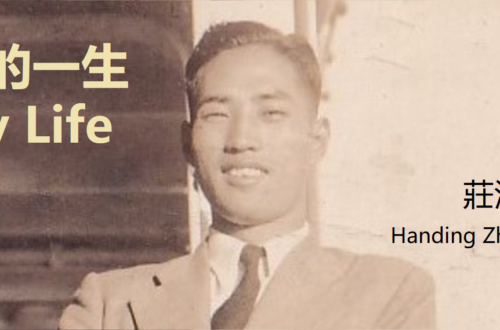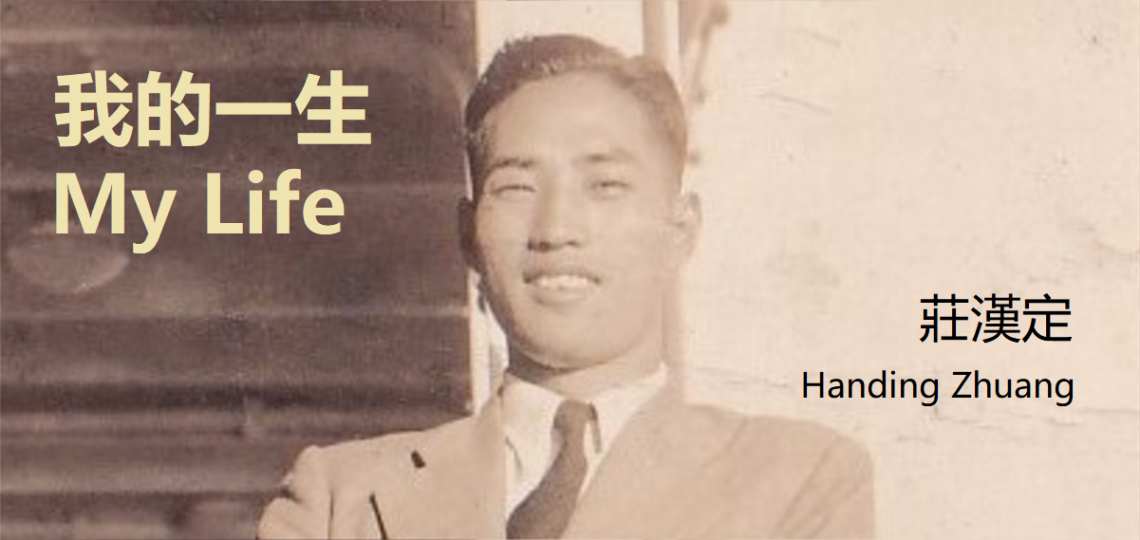
2. My Primary School and Middle School
I studied in the private school of my brother-in-law Gu Huanqing for more than three years. When I was ten (1925) in the second half of the year, my parents sent me to my third uncle’s house in Juqianjie, Changzhou. I joined Changzhou Wuyang Primary School with my second uncle’s grandson Yuan Zhenhuan (now retired in Suzhou City). He was in the first grade, and I was in the second grade for three years. I recalled that one year later, the third uncle’s environment was poor and his economy was getting worse and struggling. I also felt very uncomfortable living in my uncle’s house, so I asked my parents to agree to live in Wuyang Primary School for a semester in the first half of 1928. The cost seemed to be about 20 yuan in tuition and accommodation. My parents agreed. I was very happy that living in school was more free. I had average grades in my homework. Especially arithmetic and music were just barely passing, but I like sports very much. I love basketball and jumping.
I remembered one time when I hurt my arm in a high jump and I stopped jumping. Sometimes Uncle Jing Xiang and his friends came to the city to do errands and stayed at Sha Rongji Inn. He always came to tell me to go out to drink and eat with them. The Northern Expedition launched by the National Revolutionary Army of the Kuomintang and came to Changzhou, the school was closed. When the third uncle and the second aunt’s family had fled to Shanghai first, only the third aunt and other people were staying at home. On the afternoon of the suspension of classes, there was a teacher, named Zhou Zicheng, from my hometown Taoyeli, who took a few classmates and fled to the countryside. I also ran with them. First left the east gate and then turned the south gate. Took a lot of detours. Finally, I knew the direction when I arrived in Taoyeli in the evening then went home, and my mother was pleasantly surprised. The next day, soldiers passed on Nanniqiao Road. My two legs are swollen and I could not walk for several days. From the morning, the army passed Lijia Bridge and Nanni Bridge to Banshang and then to Changzhou. The order was good and there was no disturbance.
Recalling the life of the third uncle, he was in the era to abolish the imperial examination stereotypes and start school education. So he studied chemistry in the Military Engineering School of Jiangnan Manufacturing Bureau and received scientific and technological education. If he had the ambition to start a business, he would be able to accomplish something in his youth.
In 1928, my father was dismissed from the Dong family, and he was introduced to teach in the tuition department of Nanyang Middle School run by Qian Fuqu, a native of Nanxiashu in Changzhou. The tutoring course was the preparatory course of Nanyang Middle School. There were three grades. The first grade was the fifth grade of elementary school, the second grade was the sixth grade of elementary school, and the third grade was the first grade of junior high school. After completion of the tutoring course, students would attend the second grade of junior high school of Nanyang Middle School. My father was the Mencius and Analects courses teacher in the first grade. School started in the fall of 1928, and my father brought me to Shanghai to enter the first grade of tutoring (equivalent to elementary fifth grade, I just finished the fourth grade of primary school in Wuyang), so the homework would be still kept up. The school rules of the tutoring department was that after school, students are not allowed to leave the school without asking for leave, and can only exercise or play in the school. I liked basketball. There were a few players in our class who had good skills. The small soccer team of Shanghai Southern City Stadium (playing a small foreign ball at the time, seven-a-side) came to the school to play, such as Jia Jiliang and Jia Youliang brothers who became famous later. At that time, I lived in my father’s bedroom with a few classmates, and taught myself in the classroom at night. My grades was not bad, kept it above the pass, so my father did not urge me.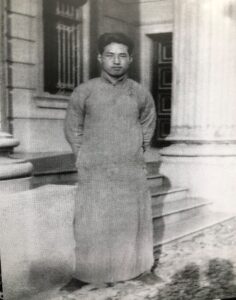
Later, around 1930, due to my father’s excellent calligraphy, principal Wang Peishun asked him to copy some rare books or the only extant copy of a rare book in the library. He no longer served as a tutoring course teacher and still lived in the tutoring course dormitory. In the autumn of 1931, I was promoted to the second grade of junior high school in Nanyang Middle School and moved into the dormitory of Nanyang Middle School, so I separated from my father. But at noon my father had lunch in the Nanyang Middle School cafeteria and I could see him again. The teachers were at the same table, and the dishes were more meaty than the dishes for students, and the dish quality was better. The father was still in the cram school for breakfast and dinner. Because of my father, I have always been free.
In January 1932, I came to Shanghai Nanyang Middle School with my father to start school. Soon after the January 28th Songhu Anti-Japanese War broke out and the school was off, I had to go back to the country home with my father. Because the teachers were not paid when the school was closed, my father’s daily use became a problem. Fortunately, in mid-April, Sun Kezhai and others introduced my father to work as a clerk at the Kaifeng Oil Refinery in Henan Province. Since then, he had worked until November 1938, then he lost his job because of the Anti-Japanese War.
This half year, Nanyang Middle School had not resumed classes. I was helping with my family. I experienced the life of a farmer during the busy season of planting rice seedlings, raising silkworms, and other work.
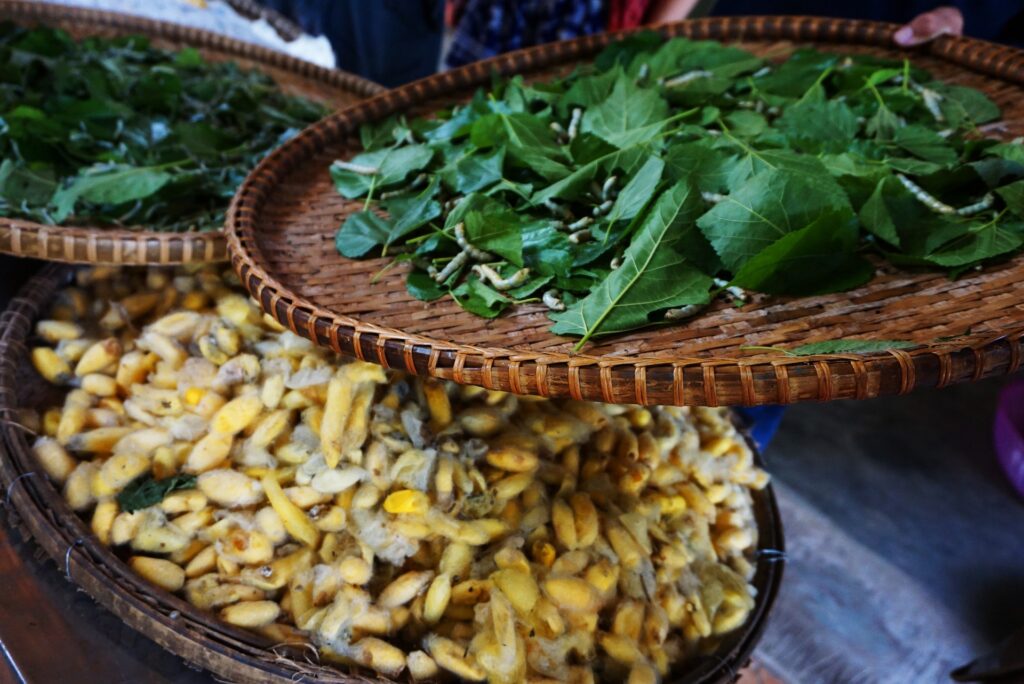
Image by Ruxandra from Pixabay

Image by Trung Hieu Dang from Pixabay
Soon after the summer vacation began, my father had resigned from Nanyang Middle School. I wondered what to do by myself. For the past three years or so, because my father was a teacher, I had been enjoying free of charge. Now that my father already left, would the school still accept me for free? Otherwise, according to the financial situation of the family at that time, it was impossible to pay the school board and lodging fee of 90 yuan per semester. I could only leave school to farm at home, and I felt a little unwilling. For this reason, I personally wrote a letter to Principal Wang Peishun, explaining the situation and asking for half the fee. Unexpectedly, Principal Wang quickly replied to agree. At that time, the half fee was 45 yuan, and it was not easy to borrow money at the time. Fortunately, my classmate Yin Zhongda and his brother Yin Zhongkui had pocket money from their father, so they had paid half of the fee for me first and I obtained the student status and boarding certificate.
I went to school as scheduled. In the next semester of the second grade of junior high school, everyone did not study because of the Anti-Japanese War, but the whole class was still promoted to the third year of junior high. The school asked the teachers and students to work harder and made up for it. Before the start of the next semester of junior high, Principal Wang took the initiative to inform me that from the next semester, my school and meal expenses were free, as long as I went to another cram school called West District after class every afternoon. The duty was to supervise them to recite the texts of the Analects of Confucius and Mencius. I knew the pain of endorsement, and I often couldn’t memorize the text by myself in the past, so I didn’t punish them for those who couldn’t memorize. I just required them to recite again. This job had helped me graduate from high school.
This was because my father was a teacher at Nanyang Middle School, and the other was under the guidance of principal Wang Peishun. In order to cultivate talents, president Wang didn’t care about tuition, so he immediately agreed to my request. But I was not a very talented student. My lack of talent led to poor homework, especially mathematics, and then English. Although I tried my best to pass the exam and graduated, I was not admitted to Jiaotong University and National Central University in the university entrance examinations in 1936 and 1937. Fortunately, father and brother Kai did not blame me. Brother Kai introduced me to work at Nanjing Baishuiqiao Research Institute. I was really lucky, since the middle school went to graduation for free, otherwise my whole life would be another situation.
When I was in Nanyang Middle School, I remembered that in March or April 1933, brother Kai came to Shanghai from Hangzhou (it seemed to have been working in Pukou Power Plant at the time) to stay in Nanyang Middle School’s dormitory for one night. Several classmates who were close to me including Yin Zhongda, Yin Zhongkui, and Xu Xixiang talked with Kai a lot. On the second day, Kai led us to visit the exhibition at Jiaotong University. In another time, Kai underwent an operation for appendicitis at Shanghai Baolong Hospital. I visited once. kai’s classmate Yinfupei seemed to be a doctor at Southeast Shanghai Medical College. It seemed that he arranged for Kai. Kai’s wife Fang also came to accompany and take care of Kai.
After the victory of the Anti-Japanese War, I went to Nanyang Middle School to pay homage to Principal Wang Peishun. Because there were a large number of free students in Nanyang Middle School, he could not remember clearly, but he still remembered the books and catalogues copied by my father in the library. He was very sorry to hear that my father had passed away. Principal Wang was dedicated to education, training talents for the country and society for his greatest wish and purpose. He was unmarried all his life. (Note: President Wang’s wife Shen Zhushu passed away in the 5th year of the Republic of China. He had no children, and Principal Wang did not marry again.) He had worked hard for Nanyang Middle School throughout his life, so he did not think of free tuition “being kind to students” nor want “being grateful”. This was the difference between the so-called “school shop” in Shanghai at that time and the schools that really cultivate talents.
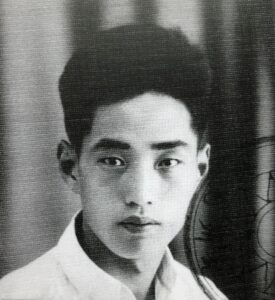 It was about the spring of 1933 in Nanyang Middle School, I applied to Hangzhou Jianqiao Aviation School. I passed everything else except my heart with premature beats. If I passed the exam at that time, I might not write this “My Life” today.(most of the Hangzhou Jianqiao Aviation School students bravely died for the country in the Anti-Japanese War.)
It was about the spring of 1933 in Nanyang Middle School, I applied to Hangzhou Jianqiao Aviation School. I passed everything else except my heart with premature beats. If I passed the exam at that time, I might not write this “My Life” today.(most of the Hangzhou Jianqiao Aviation School students bravely died for the country in the Anti-Japanese War.)
Registration photo of Hangzhou Jianqiao Aviation School.


